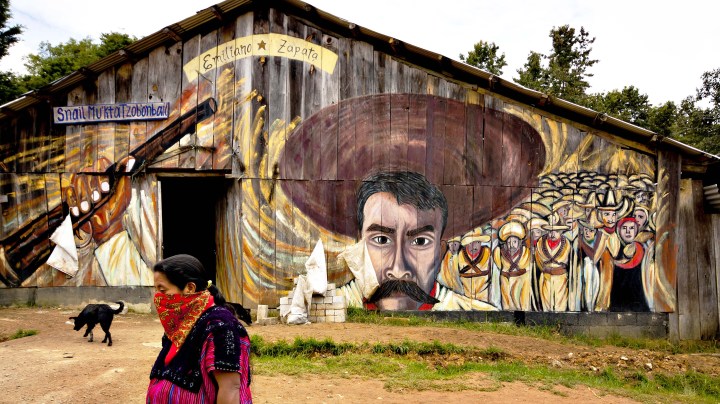Meet Mexico’s First Ever Indigenous Woman Presidential Candidate

A woman, with face covered, passes by a mural painting in the Oventic village in Chiapas, run by Zapatistas. Photo by Dekaro / iStock Editorial / Getty Images Plus
Maria de Jesus Patricio Martinez, known to most as Marichuy, is a Nahua curandera from Jalisco. Born in 1963, she’s dedicated her life to the health of her community through traditional medicine and herbology. In late May, however, hundreds of delegates representing their indigenous communities from across Mexico descended on San Cristóbal de Las Casas for the National Indigenous Congress (CNI) and named her as their presidential candidate for the 2018 election.
Thousands of observers in attendance from around the world erupted in cheers and applause as she accepted the position declaring, “Our proposal on behalf of the National Indigenous Council and our brothers and sisters of the EZLN who spoke their piece is not to work so much to receive votes, or to sit over there in the malicious [presidential] chair. Rather, our participation is one for life. It is for our organization. It is for the reconstruction of our peoples who have been beaten for years and years. Now we need to find a way to continue existing… Here, those who will be on the front lines are present. They’re the 71 representatives, men and women, who will form the Indigenous Council for Government.”

Marichuy’s position, despite being named as the CNI’s presidential candidate, is not one of leader, but of spokesperson. Drawing from the roots of indigenous systems of governance, decisions will be made starting in community and regional assemblies until they reach the Indigenous Council for Government (CIG), whose members were also named at this convening. Their guiding principles are those put to the test by the Zapatistas in the past two decades:
- Obey and not command.
- Represent and not supplant.
- To go from below and not from above.
- To serve and not serve oneself.
- To convince and not beat.
- To construct and not destroy.
- To propose and not impose.
Little is known about what the future holds for this unprecedented candidacy, but one thing is for sure: Mexico, and the world, is in need of healing. Marichuy may be just the healer to attend to the wounds and begin the process.